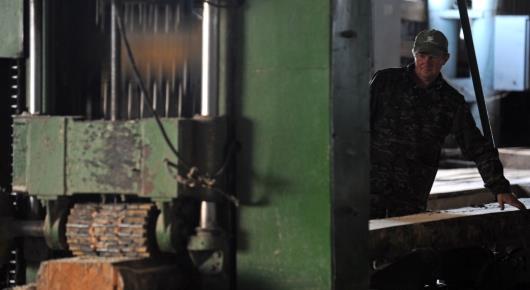Diversification, new technologies to lead the way to green jobs in forest sector

The future of “green jobs” in the forest sector is the focus of an international workshop opening here today.
Promoting and developing green jobs, identifying new skills that will be needed by the European forest sector, and supporting sustainable development and the transition to a green economy are important workshop themes. Policies, tools and mechanisms to encourage environmental sustainability and decent employment in the forest sector are also expected to be at the centre of the debate.
Organized jointly by FAO, the United Nations Economic Commission for Europe (UNECE), and Forest Europe, the workshop was opened this morning by Gabriela Matečná, Minister of Agriculture and Rural Development of the Slovak Republic, as Slovakia currently co-chairs the Forest Europe process.
“Globalisation, digitalisation, changing requirements of society, and changing labour markets influence the forest sector,” Matečná said. “If the forest sector wants to stay economically viable and maintain its role in society, it cannot ignore these trends. It is becoming evident that diversification and new technologies will be dominating a future forest sector.”
The Minister also highlighted the need to adapt forestry education and training in Europe to provide future forest workers, forest managers and forest owners with new technical skills as well as communication, conflict management and entrepreneurship skills.
Social aspects such as job stability, remuneration, working conditions, informal work, as well as problems with outsourcing or possible involvement of migrant work in the sector are also expected to come under discussion.
With women accounting for only about 20 percent of the forest sector workforce, a roundtable session will be dedicated to measures to promote gender equality.
According to the State of Europe’s Forests 2015 report, about 30 percent of all people employed in forestry in Europe are 49 years of age or older. The forestry workforce is ageing, posing a significant threat to the future of forestry.
Attracting younger generations to careers in the sector is a challenge, but technological innovation may offer solutions.
In the words of Diarmuid McAree, deputy leader of the UNECE/FAO/ILO Team of Specialists on Green Jobs in the Forest Sector, “The potential for green job creation linked to the production of energy from renewable sources, energy efficiency, waste and water management, air quality improvement, restoring and preserving biodiversity, providing green spaces and infrastructure for eco-tourism, and developing green infrastructure is significant.” McAree underscored the importance of the Rovaniemi Action Plan, a blueprint for the green economy in the forest sector in the UNECE region, which explicitly addresses green jobs policies.
“Recommendations and proposals for promotion of green jobs in a green, bio-based or circular economy,” said Ľudmila Marušáková, head of the Liaison Unit Bratislava, will also contribute to fulfilment of the Madrid Ministerial Resolution: Forest Sector in the centre of a Green Economy, a political commitment adopted by more than 40 European countries and the European Commission.
Nearly 70 participants from 20 European countries – representing Forest Europe signatory countries, the UN system, the European Commission, nongovernmental organizations, science and academia, training centres, European forestry associations, private industry, forest certification organizations and more – are in Bratislava for the workshop.
Workshop participants come from Albania, Armenia, Austria, Belarus, Belgium, Croatia, Finland, Georgia, Germany, Iceland, Ireland, Norway, Poland, Serbia, Slovakia, Spain, Sweden, Turkey, Ukraine, and the United Kingdom.
27 June 2017, Bratislava, Slovak Republic
